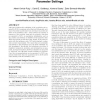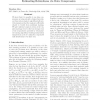443 search results - page 7 / 89 » Learning from a Population of Hypotheses |
PPSN
2004
Springer
14 years 3 months ago
2004
Springer
Abstract. Exploiting the diversity of hypotheses produced by evolutionary learning, a new ensemble approach for Feature Selection is presented, aggregating the feature rankings ext...
GECCO
2007
Springer
14 years 4 months ago
2007
Springer
This paper analyzes the scalability of the population size required in XCS to maintain niches that are infrequently activated. Facetwise models have been developed to predict the ...
ICML
2006
IEEE
14 years 10 months ago
2006
IEEE
We show that it is possible to use data compression on independently obtained hypotheses from various tasks to algorithmically provide guarantees that the tasks are sufficiently r...
VIS
2009
IEEE
14 years 11 months ago
2009
IEEE
In this paper we describe a novel method to integrate interactive visual analysis and machine learning to support the insight generation of the user. The suggested approach combine...
GECCO
2003
Springer
14 years 3 months ago
2003
Springer
Abstract. Population size for EvolutionaryAlgorithms is usually an empirical parameter. We study the population size from aspects of Ô¨Ātness landscapes‚Äô ruggedness and Probably ...


